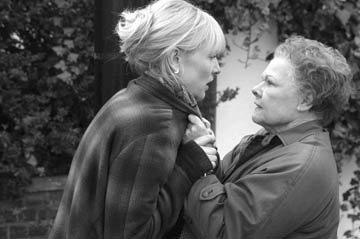
Two movies offer differing views on how people hurt the ones
they love
Now if there are hundreds of movies around weddings
– as I pointed out in a column a few months ago as I prepared
for a month of wedding-related events – there are just as many
about the demise of relationships.
Affairs to remember
Now if there are hundreds of movies around weddings – as I pointed out in a column a few months ago as I prepared for a month of wedding-related events – there are just as many about the demise of relationships.
Though they were done in very different ways, “Conversations with Other Women” and “Notes on a Scandal” both dealt with the strain of relationships and the ways in which people can most hurt the ones they most love. It’s a price we pay for giving up a little bit – or a lot – of our hearts to someone else, I guess, and it is always a gamble.
The first film, “Conversations with Other Women,” is done in a unique format with split screens. This means half the screen is shown from the point of view of a woman (Helena Bonham Carter) and the other half is shown from the point of view of a man (Aaran Eckhart.)
The film starts with a man offering a woman a glass of champagne at a wedding. They seem to be strangers as the woman declines the flute, but accepts a dance with the man. Soon it becomes clear that they know each other, at least as acquaintances. He is the brother of the bride and she is a last-minute fill-in as a bridesmaid.
As they continue their conversation, it becomes clearer that they know each other much more intimately and the stilted small talk at the beginning of the film was a way for them to pretend they don’t have a former life together and that they do not now have separate lives.
The split screen is an interesting way to give the viewer a sense that in every relationship there are two different points of view. One of the best ways I’ve ever heard it put is in the song “Hour Follows Hour” by Ani DiFranco in which the singer says “Don’t fool yourself into thinking things are simple. Nobody’s lying; still the stories don’t line up.”
The man and woman – who have no names in the film – used to be married, but it is more than 10 years since they last saw each other. She is now married to an older man, a London doctor, and he is dating a 22-year-old dancer. As they talk about their current lives, moments of their past flicker on one side of the split screen. They are seen as they were when they first fell in love, as newlyweds and in the aftermath of the breakup. When the woman accepts the champagne flute, each party knows what the inevitable outcome of the evening will be – and they both know it will be just one night together until they return to their real lives.
In “Notes on a Scandal,” the alabaster-skinned Sheba Hart (Cate Blanchett) is a married mother of two who considers herself an artist. When she takes a job as an art teacher at a tough English school, the students run roughshod over her until an older, bitter woman comes to her rescue. Barbara Covett (Judi Dench) has been a teacher at the school forever and though she dislikes almost everyone in the school, she takes a liking to Sheba.
As narrator, the viewer gets insight into Barbara’s early thoughts about Sheba – Barbara seems to regard her as insipid – but as she helps the younger woman make her way through the halls of adolescence, the older woman is drawn to Sheba more and more. The two start to spend time outside of the classroom, as Sheba invites Barbara over for lunch with her family and Barbara shares her worries about her aging cat, Portia.
When Barbara discovers Sheba is having an affair of the most unacceptable kind, rather than telling Sheba’s husband or reporting it to the authorities, Barbara offers to keep Sheba’s secret as long as she breaks off the affair. Through her diary entries, we know Barbara believes the secret between the women will give her leverage over Sheba and make them even closer.
Between the two movies, the relationships in “Notes on a Scandal” are much more complex than those in “Conversations with Other Women” and the cast in “Notes” is extraordinary. Dench rules the screen as the menacing Barbara who is willing to poison the one relationship she wants to keep most for revenge. Blanchett almost draws the sympathy of viewers as the teacher seduced by a teenager who then breaks her heart and who is betrayed by her closest friend. Bill Nighy plays Blanchett’s husband and he gives the strongest performance of the movie when he discovers the affair.
As affairs must – since they start off on the most faulty of footings – the movies do not end happily. Both are worth a watch on a night when one is looking for a little melancholy company.








